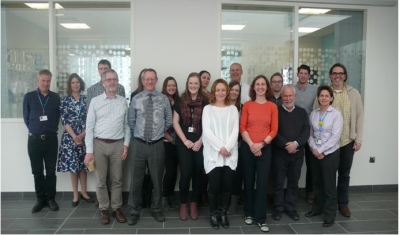STAR - Support and Treatment After Replacement
Many people have total knee replacement operations because of the pain caused by osteoarthritis. Unfortunately, around 20% of these people (one in five) will have moderate or severe long-term pain after their operation.
This means that roughly 15,000 people in the UK every year will have long-term pain after knee replacement surgery.
A set of development projects were supported by the National Institute for Health Research through a Programme Development Grant in 2013-14. That work provided the background to a 5-year programme of research into long-term pain after knee replacement.
The STAR Programme
The STAR programme began in September 2015 and has six parts.
- Working out what happens after surgery that might indicate whether someone will get long-term pain afterwards, through study of published research (systematic reviews) as well as looking in detail at existing research data
Systematic reviews have been completed in the areas of:
- identifying treatments that work for long-term pain after surgery
- risk factors present after knee replacement that might affect long term pain
A further three systematic reviews on have been registered, completed and published. They concern the effectiveness of treatments before, around, and after the time of replacement in preventing long term pain. - Finding out what happens to people living with long-term pain, including how much it costs them and the health services to have this type of pain (a cohort study and analysis of data from the National Joint Registry (NJR) with linkage of other healthcare information)
Large datasets from the NJR alongside data from NHS Digital are being used during this study. The personal identifiers of patients who had knee replacement surgery and consented for their details to be stored in the NJR have been securely transferred to NHS Digital. NHS Digital links the data to information it collects and extract details of all hospital admissions (HES) for the study cohort and Patient Recorded Outcome Measures (PROMs). NHS Digital securely transfers the linked data to the University of Oxford as pseudonymised data (i.e. all identifiers are removed and replaced with a unique patient ID). The NJR securely transfers pseudonymised information from its records to the University of Oxford using the same unique ID so that the data can be linked by the University of Oxford and processed in such a way that researchers cannot identify patients.
Access patient information, and the NJR study website. - Finalising best ways to care for people with long-term pain, which has now been published here.
- Testing out best ways to provide care for people with long-term pain, in a large project in eight hospital sites (a randomised controlled trial) (registered in September 2016 with the ISRCTN; protocol published in Trials). As part of trial processes, we developed a clickable bodymap that can be used by other bona fide researchers working in the field of pain. We have also published a paper about recruitment into trials.
- Finding out why some people do not use healthcare services for their long-term pain after knee replacement (a qualitative study). We spoke with 34 people who had long-term pain after knee replacement. Many thought that further treatment would be unlikely to benefit them and some prioritised other health conditions above their pain. Findings can be seen in this recent publication.
- Putting research findings into practice (using implementation science)
The STAR study was developed in collaboration with the University of Bristol’s Musculoskeletal Research Unit’s patient involvement group, PEP-R, and in collaboration with VersusArthritis. The study has benefited greatly from user involvement.
NIHR New Media competition winners
In March 2016 we made a short film. Later that year, it was announced that this film had won a special prize for demonstrating "the positive impact of embedding patient and public involvement into a research project".
We will provide links to findings from the programme on this website in due course.
People involved in STAR
STAR's study team is led by Professor Rachael Gooberman Hill, working with Professor Paul Dieppe (University of Exeter), Professor Jo Adams (University of Southampton), Dr Nicholas Ambler (North Bristol NHS Trust), Professor Nigel Arden (University of Oxford), Mrs Wendy Bertram (North Bristol NHS Trust), Mr Andrew Beswick (University of Bristol), Professor Ashley Blom (University of Bristol), Dr Julie Bruce (University of Warwick), Ms Amanda Burston (University of Bristol), Professor Christopher Eccleston (University of Bath), Dr Shaun Harris (University of Bristol), Dr Sara Khalid (Universty of Oxford), Mr Nick Howells (North Bristol NHS Trust), Professor Andrew Judge (University of Bristol), Dr Athene Lane (University of Bristol), Mr Stewart Long (VersusArthritis), Dr Fiona MacKichan (University of Bristol), Professor Candida McCabe (University of the West of England/Royal United Hospitals NHS Foundation Trust, Bath), Dr Andrew Moore (University of Bristol), Mrs Gemma Munkenbeck (North Bristol Trust), Dr Sian Noble (University of Bristol), Professor Tim Peters (University of Bristol), Mr Jonathan Philips (Royal Devon and Exeter NHS Foundation Trust), Dr Rafael Pinedo-Villanueva (University of Oxford), Professor Andrew Price (University of Oxford), Mrs Rhona Galt (North Bristol NHS Trust), Ms Emily Sanderson (University of Bristol), Mr Andrew Toms (Royal Devon and Exeter NHS Foundation Trust), Professor David Walsh (University of Nottingham), Mr Simon White (Cardiff and Vale NHS Trust) and Dr Vikki Wylde (University of Bristol).

STAR's Programme Steering Committee
STAR's Programme Steering Committee is as follows:
Professor Joy Adamson (Chair) (University of York), Professor George Peat (Keele University), Dr Mark Rockett (Plymouth Hospitals NHS Trust), Lizzy Betts (Member of the Public) and Dr Paul Ewings (Taunton & Somerset NHS Trust).
Funding
This study is funded by the National Institute for Health Research (NIHR) [Programme Grant for Applied Research (Grant Reference Number RP-PG-0613-20001)]. The views expressed are those of the authors and not necessarily those of the NIHR or the Department of Health and Social Care.
Further information about the National Institute of Health Research can be found on the NIHR website.

Contact
For further information regarding the study please contact Wendy Bertram, STAR Trial Manager.